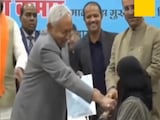Twenty-four of the 25 villages in Madhya Pradesh's Kuno National Park (KNP), where Prime Minister Narendra Modi will release the first batch of eight cheetahs from Namibia on September 17, have been completely resettled, Union Environment Ministry officials said on Monday.
The lone remaining Bagcha village with 148 houses will be resettled before September 17 and all preparations have been made in this regard.
"The KNP, which spans across 740 square kilometers, has only one village on its periphery at present. The process to resettle the village is underway and it will be completed before September 17," an official said.
"Twenty-four of the 25 villages have been completely resettled over the last 10-15 years. They have been brought into the mainstream," he said.
Union Environment Minister Bhupender Yadav told reporters that the Madhya Pradesh government will give "revenue village" status to these villages.
A revenue village is a small administrative region with defined borders. One revenue village may contain many hamlets. A village administrative officer is the head officer of a revenue village.
Mr Yadav also said the state government will set up skill development centres in the area.
There is no record of free ranging cheetah attacking humans. However, it can attack and kill small livestock such as goats, sheep and calves. Village communities have been made aware of it, officials said.
In case the cheetahs kill any domestic animal, the government will give adequate compensation to the affected caretaker, they said.
A chartered flight carrying eight cheetahs, five females and three males, will depart from Namibia's capital Windhoek on September 16 and reach Jaipur airport on the morning of September 17, which is also PM Modi's birthday. They will then be flown to the KNP in helicopters which will take 40-42 minutes.
At the KNP, the Prime Minister will release the cheetahs, aged four to six years, in smaller quarantine enclosures where they will kept for 30 days. They will then be released in a six-sq km predator-proof holding facility with nine compartments.
A senior official said facilities created at the KNP for the reintroduction of cheetah are "10 times better" than those in Namibia and South Africa.
Mr Yadav on Sunday took stock of the preparations made at the KNP for the ambitious programme which is the world's first inter-continental translocation project of a large carnivore like cheetah.
Mr Yadav said India aims to acquire 50 African cheetahs over the next five years.
India and Namibia had in July signed a pact for the reintroduction of cheetahs to the country. A pact will soon be signed with South Africa to bring 12 cheetahs.
Namibia and South Africa are home to more than a third of the world's 7,000 cheetahs.
The fastest land animal in the world was declared extinct in India in 1952. The cheetah is the only large carnivore that got completely wiped out from India, mainly due to over-hunting and habitat loss.
The last spotted feline died in 1948 in the Sal forests of Chhattisgarh's Koriya district.
(Except for the headline, this story has not been edited by NDTV staff and is published from a syndicated feed.)















